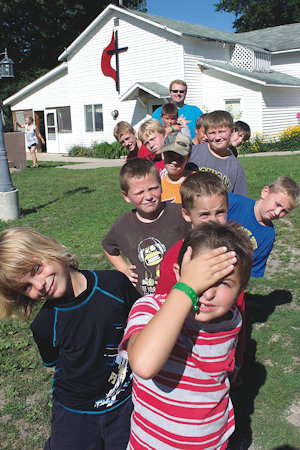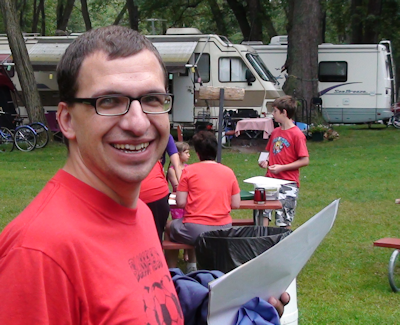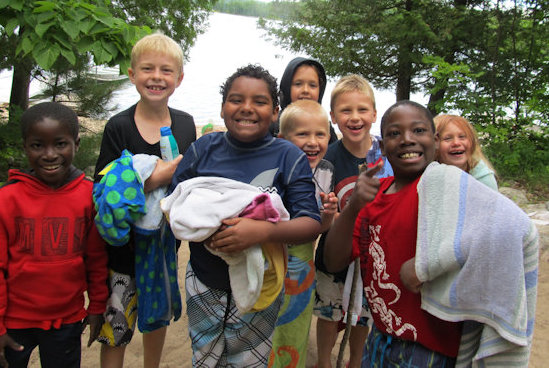REV. TOM MACAULAY
Pastor Detroit Conference, retired
It is hard for me to believe, but I am now in my 44th year of ministry!
I have served as an Associate Pastor, solo Pastor, Senior Pastor, District Superintendent and now, in retirement, as an Assistant Pastor. The places I have served have included settings in suburbs, inner city, small town and exurban Detroit.
This past March, Dr. Jerry DeVine, Director of Connectional Ministries for the Detroit Conference, called and invited me to consider serving as the “Interim Director of Outdoor and Retreat Ministries.” The position opened up when Dr. James Parkhurst left for similar ministry in the Oregon-Idaho Conference.
So, from mid-March through mid-November of 2015, that was what I did. To be clear, I was acting as an administrator for the camping and retreat ministries and not “pitching tents” around our beloved state. Time and again, as I visited the four camps and three affiliates of the DAC, I was struck by the warm welcome extended both to me and to those I witnessed arriving.
I believe that what I experienced in places like Myers Lake and Michigamme might be instructive for our congregations as we seek to serve in God’s future.
I found that our Camp Directors and their staffs expected visitors… because they knew that they needed more people this year to replace those who could not find time to come camping. They expected visitors by using a wide variety of ways to

retain their existing campers, even as they reached out to new campers. The staffs visited congregations and partnered with them. The camping and retreat ministry folks used new forms of technology alongside familiar formats like brochures and websites. Camping staffs were willing to continue programs that met needs but were also eager to explore innovative avenues for reaching new campers.
I also found that our camping and retreat staffs planned for visitors. They made it easy by posting directions on websites, ensured that staff were in place, trained and eager, to meet campers. Counselors and staff were equipped to deal with a wide variety of issues such as homesick campers, injuries, and behaviors disruptive of community. Planning in advance indicates to one and all that those who come are important. Planning for visitors is a clear indication that visitors and newcomers are not an interruption to ministry but the very center of ongoing efforts.
Our camping programs understand that they need visitors. In today’s environment, what served us well last year (or five years ago), will be a woefully inadequate response for today’s children, youth and adults. Change is the order of the day. To serve Christ means that we are all called to respond to those whom Christ loves. We must do our very best to welcome them, share with them and provide a solid Christian experience with people who are both like them and different from them. Visitors and newcomers are the very reason our four camps and three affiliates in the Detroit Conference and five camps/retreat centers in WMC exist. Camps and retreat centers need visitors and newcomers as our population ages and evolves.
When I became the Superintendent of the Ann Arbor District I visited the congregations. Often these ventures were my first time entering a church building for which I was not serving as pastor. Usually I was stunned at the non-reception and non-welcome I received. This was before most knew I was their D.S…. but that’s another article!
When I visited our camps, I was struck by the warm and infectious smiles, the ways staff greeted their new charges, the genuine delight in the chance to meet and greet new friends and the authentic sense that those who were arriving must experience welcome and hospitality!
I believe that these lessons I witnessed while among our camping staffs might be instructive for our congregations’ members. I believe that for the Church to have a more viable and vibrant future, we will need to do things differently. We need to move out into our communities and work with people of goodwill who may not be familiar with us. We must realize that when visitors do come to visit, how they feel in the first few minutes will usually determine if they return a second time or not. If people are met with indifference or are refused help in becoming acclimated, they likely will not return a second time.
To be sure, the members of the congregation bear responsibility for the leadership and support of various ministries of congregational care. I have heard people exclaim, “Yes, Tom, but we’re the ones paying all the bills!” True enough, but if United Methodist Christians do not do a better job of balancing programs, ministries and relationships between those who are already “in” and the visitors who come to see what we have to offer, we will find ourselves with increasingly fewer and smaller congregations. The cause of Christ in our state will suffer profoundly.
What I’ve long believed and had reinforced by my experience with our camping ministry is that the ministry you and I are called to live out is not about us. It is about the One who calls us

to love and serve God as we love and serve others.
The way we welcome visitors and newcomers is the vital first step toward a relationship with Christ and with our community of faith. Thus, when we fail to welcome the newcomer, we not only go against the grain of much of the thrust of our scriptures… we cut ourselves off from those whose gifts might enhance our common ministry. And we all lose. So I encourage you, if you’re not already intentional about doing so, to strive to be more welcoming to visitors, newcomers to your community, or those who have no faith family.
Take a look around your congregation and try to see it as a newcomer might. What barriers do you see? Where have you erected walls that separate “member” and “visitor”? What kind of signs do you have to direct the newcomer… in the parking lot, inside the walls of the church, and within the worship service? What kind of “insider” language do you use to communicate to those you know that exclude or confuse those who are new? Most congregations view themselves as “friendly” while, in fact, many are “friendly” with those they already know and indifferent or inadequately prepared to meet and greet those they do not yet know.
I am very, very grateful for the opportunity presented to me in that call from Jerry DeVine. The hospitality exhibited by our camping and retreat ministries has much to teach us who serve in congregations across Michigan.
I learned a lot about ministry in that outdoor context. I hope you learn from our sisters and brothers, as I did, in order to better be and share Good News for the sake of the world that Christ loves so very, very much!
Last Updated on December 15, 2023

